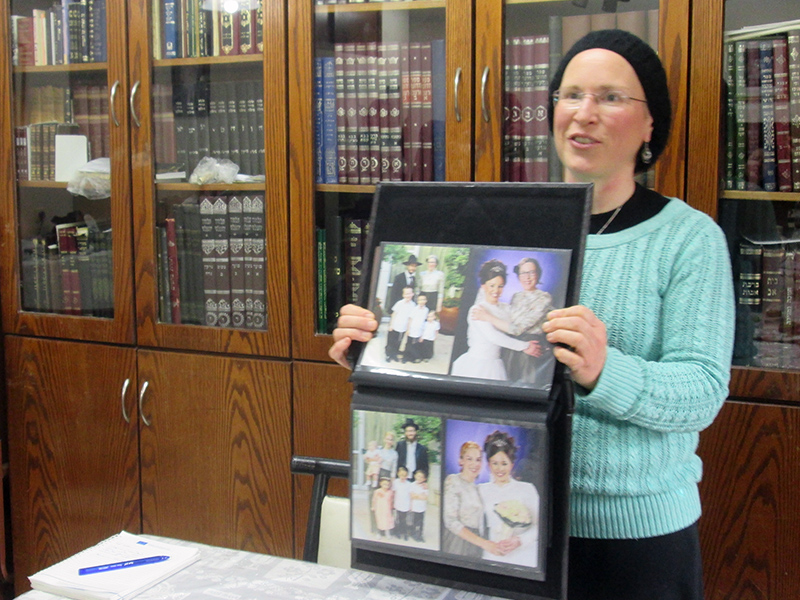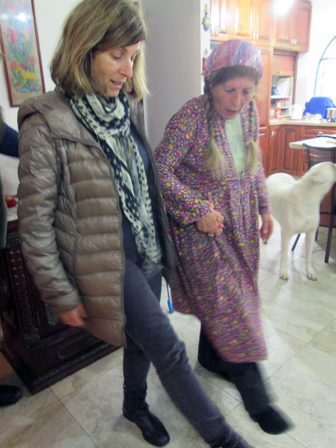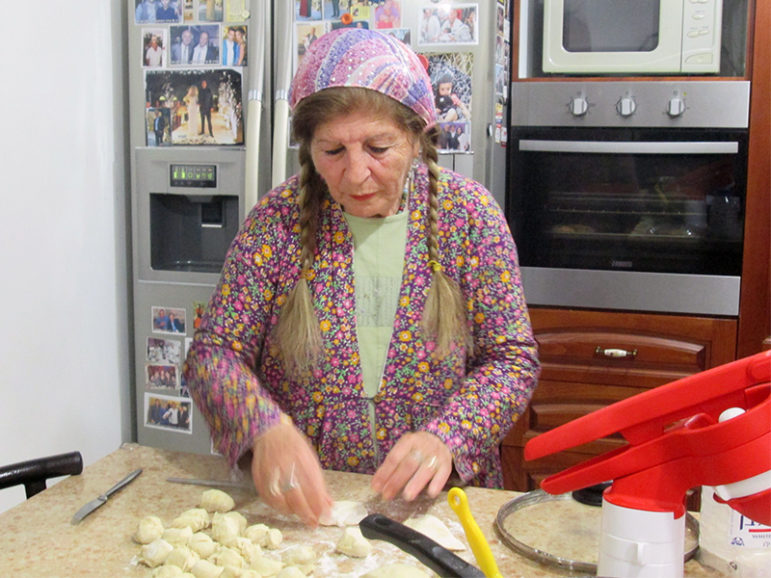JERUSALEM (RNS) Naomi Miller’s living room was ready for company.
Her long table was set for lunch and her dining room chairs – the only other furniture in the room, save for bookcases stacked with religious texts — faced outward in a semi-circle, so her guests could listen to a presentation she’d prepared about her life as a haredi, or ultra-Orthodox, Jewish woman.
When her guests arrived at her apartment in a haredi neighborhood, Miller, dressed modestly in a skirt, sweater, opaque black stockings and a black hat that hid her hair, urged them to feel at ease.
For many it was the first time they had been inside a haredi home.
Miller, 46, told of how she married her husband after meeting him just a handful of times.

Naomi Miller, 46, an ultra-Orthodox Jew, shows guests photos of some of her many children and grandchildren. RNS photo by Michele Chabin
“In haredi society we don’t agree to meet unless the intention to get married is serious,” she said, adding that she wed at 18 and today has 12 children and 13 grandchildren “with more on the way.”
Over a home-cooked meal of salads and cholent – a traditional Jewish stew – Miller shared how she and her husband, an educator, can afford to feed so many children.
“Many haredi families don’t have a car and the children have a simpler lifestyle. They’re not demanding computers,” she said, noting that computers, and especially the internet, are largely prohibited by many haredi rabbis.
This unusual encounter between Miller and her guests (on this afternoon it was a group of journalists) was part of Women and Tales in Jerusalem, an initiative spearheaded by the Jerusalem municipality with support from the Ministry of Tourism.
Created to help women, especially those from Israel’s minority communities and those who are retired, earn an income, the project “also fills a tourism niche,” said Mina Genem, the tourism ministry’s senior deputy director of strategy and policy planning.
Yael Kurlander, the group’s project manager, came up with the idea during a visit to China six years ago, where she encountered home hospitality as a form of tourism.
“I knew I needed to bring this back to Jerusalem,” Kurlander said.
So far, the program has 60 participants from the ultra-Orthodox and Arab sectors, as well as several women from Ein Kerem, a neighborhood in southwest Jerusalem that is home to many immigrants from Yemen and Morocco. The latter offer cooking classes while relating their life stories.
To be accepted, participants must have an entrepreneurial spirit, attend training sessions about professional hospitality and marketing and, most importantly, truly enjoy welcoming guests.

Dalia Harfoof, right, a 66-year-old Jewish woman who participates in a cultural tourism initiative in Jerusalem, teaches guests a traditional Kurdish dance. RNS photo by Michele Chabin
In her large, modern kitchen, Dalia Harfoof, 66, a member of Israel’s Kurdish Jewish community, said she signed up for the program after she retired and her youngest child left home.
“The house became very empty and my husband and I decided to do this together,” she said, rolling out dough to make sambusak, a savory pastry she stuffed with crushed chickpeas.
In her living room in her house in the Arab village of Beit Safafa in south Jerusalem, Samira Aliyan handed out homemade sweets while recalling how she met and married her husband, a resident of Israel. She was 17 and lived in a small West Bank village under Jordanian rule. This made their coupling a “mixed marriage,” she said.
“When I moved here we had only one room and the kitchen and bathroom were outside,” she said in fluent Hebrew as her guests marveled at her home’s rich and ornate Middle Eastern décor. “Slowly we expanded and now I cook for 60 guests at a time,” she said.
Tzvia Birnbaum, who spearheads the haredi women’s segment of the program, said the hosting enriches the women.
“It boosts their self-esteem and gives them an income. It also exposes others to haredi society and gives us the opportunity to correct misconceptions about our way of life.”
Kimmy Caplan, an expert on ultra-Orthodox Jews at Bar-Ilan University, said a hospitality initiative among haredi Jews is unusual.
“With the exception of a couple of groups that focus on outreach, haredim generally don’t divert their energies to discourse with the ‘other’ or open their homes,” he said.
But Miller said her haredi way of life offers lessons for others.
Not long ago, she said, one of her married daughters was due to give birth and was staying at Miller’s home because Miller is a doula.
“When her contractions began, she didn’t want to go to the hospital so quickly, and then we had to call an ambulance. When the paramedics arrived,” Miller said, “it was too late.”
Miller’s daughter gave birth in a bedroom and then paramedics transported the new mother and her newborn outside just as a group of guests was arriving. Miller didn’t cancel their visit.
“Things like this don’t happen every day,” she said, “but it’s symbolic of what happens in our community. We have many, many children,” Miller said, her eyes sparkling. “We have to be ready for anything.”
(Michele Chabin is RNS’ Jerusalem correspondent)





